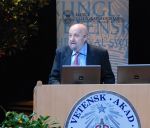Giovanni Jona-Lasinio is one of the greatest Italian physicists and it is well-known for his contributions to quantum field theory and statistical physics. He belongs to the School of Rome that yielded three Boltzmann medallists: himself, Giorgio Parisi and Giovanni Gallavotti. His model, postulated together with Yoichiro Nambu, represents the right behaviour of quantum chromodynamics at very low energies and put the basis for the future understanding of broken symmetries in particle physics. Indeed, Jona-Lasinio took the Nobel medal  on behalf of Nambu and presented also the lecture. Nambu could not go to Stockholm and so, the award passed by the hands of Jona-Lasinio. That year two Italian names were associated to that prize, the other one was Nicola Cabibbo. Jona-Lasinio has been one of my professors during my graduation course at University La Sapienza, together with Luciano Maiani and Nicola Cabibbo. I have got the best instruction and, of course, gaps are all mine. The School of Rome has been one of the main engines toward the complete realization of the Standard Model of particle physics as testified by the people I have just named. Then, most of these persons moved to statistical mechanics realizing great findings in this area and Jona-Lasinio was one of them. Sometime, he expressed some criticisms to particle physics as is practised today and in the last decades. This view is absolutely shareable and recently he presented it again in an interview to Asimmetrie (in Italian), the journal of Istituto Nazionale di Fisica Nucleare on 17 January 2014. You can find the full interview here. The interview was in Italian but the part numbered as 11 yields the critical view. I give here a translation:
on behalf of Nambu and presented also the lecture. Nambu could not go to Stockholm and so, the award passed by the hands of Jona-Lasinio. That year two Italian names were associated to that prize, the other one was Nicola Cabibbo. Jona-Lasinio has been one of my professors during my graduation course at University La Sapienza, together with Luciano Maiani and Nicola Cabibbo. I have got the best instruction and, of course, gaps are all mine. The School of Rome has been one of the main engines toward the complete realization of the Standard Model of particle physics as testified by the people I have just named. Then, most of these persons moved to statistical mechanics realizing great findings in this area and Jona-Lasinio was one of them. Sometime, he expressed some criticisms to particle physics as is practised today and in the last decades. This view is absolutely shareable and recently he presented it again in an interview to Asimmetrie (in Italian), the journal of Istituto Nazionale di Fisica Nucleare on 17 January 2014. You can find the full interview here. The interview was in Italian but the part numbered as 11 yields the critical view. I give here a translation:
I see… Also young people… Now there is not a position for everybody, especially in Italy, it is become hyper-competitive and so, this is a sociological fact, a lot of works come out, for young people is important to publish a lot, a lot of works come out that differ each other, I say, by an epsilon, and so we say the level is lowered a lot of… of… It is exactly the contrary of what was happening then because then to not publish was considered a virtue and maybe to have more interests. Now, there is hyper-specialization instead. So, where physics goes I do not know. Particle physics that was always considered fundamental physics even if indeed, in the second half of ‘900, the most important progresses were in statistical mechanics and condensed matter rather than particle physics, and biology. But indeed now with the experiments, I do not believe that after the LHC other accelerators will be made. Then, one recurs to cosmology also to have information on particles, so this is indirect knowledge. Where it will end particle physics I do not know because there is this aura, that I consider artificially kept yet, because it uses a huge quantity of money and so there is the need to present itself with a façade always of big… so futuristic, but I have no idea where it will go.
It is a fact that particle physics has not seen a great revolution since the end of seventies of the last century and LHC is yet there to check that somewhat old physics. Standard Model developed on sixties and seventies of the last century and we can date back the Higgs mechanism to 1964, very few years after Nambu and Jona-Lasinio proposal. Supersymmetry, if will be ever seen, is old as eighties of last century. After this, we have lived our latest thirty years with metaphysics without any sound foundation from experiments. Rather speculations.  Some of these ideas become so strong to convince people that these are the truth with bad consequences for all the community. This is now a recurring attitude for physicists. In other periods, most of the papers that today appear as great advances would be considered rubbish as now we use to accept shaky foundations for brave proposals.
Some of these ideas become so strong to convince people that these are the truth with bad consequences for all the community. This is now a recurring attitude for physicists. In other periods, most of the papers that today appear as great advances would be considered rubbish as now we use to accept shaky foundations for brave proposals.
Let me conclude with the concluding remarks by Richard Feynman at Caltech on 1974:
So I have just one wish for you–the good luck to be somewhere where you are free to maintain the kind of integrity I have described, and where you do not feel forced by a need to maintain your position in the organization, or financial support, or so on, to lose your integrity. May you have that freedom.



 Posted by mfrasca
Posted by mfrasca 
